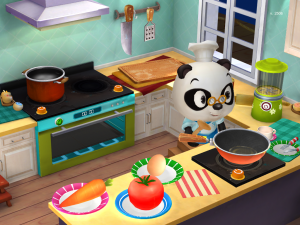
Last month, here at TribePlay, we celebrated the two-year anniversary of Dr. Panda games. Since its initial release, the Dr. Panda series has expanded to over 14 educational games for kids. Dr. Panda games are uncommon in the sense that they do not focus on math and languages, but on life skills: skills that help kids recognize and deal with situations in everyday life.
In the two years we’ve been making kids’ apps, we have become strong believers in the importance of teaching life skills. However, it was actually a bit of serendipity that planted the idea of these educational games in our heads.
Before we started working on Dr. Panda in 2011, we were working as a game outsourcing company. One of our projects was to build a virtual world for children aged 6-12. It became a huge success in my home country of the Netherlands. When I observed children playing in our virtual world, it struck me how much they enjoyed role playing. They would customize their own room as a restaurant and ask their virtual friends to sit on chairs while they pretended to cook and serve imaginary food to them. The guests would then pretend to eat with text bubbles saying “mmmm, that tasted nice.” They wouldn’t stop at the restaurant either: they would go on to simulate school life, going to a hospital, taking care of imaginary babies. These kids seemed to love to perform activities in the virtual world for which they were too small in real life. This virtual world made perfect sense to them.
That observation had a profound impact on us when we decided to develop our own mobile games. We wondered if we could somehow apply our experience from the virtual world to our new product, which would eventually become Dr. Panda. Could we use children’s love for role-playing for educational purposes, and if so: how?
We made two important decisions. First: if we want to teach life skills, then we must touch on subjects that kids would recognize in real life so that they can learn from it. Second: if we want children to learn something, they should also enjoy it so that they will remember better. These two tenants became the basis of our design philosophy for Dr. Panda.

So how does this work in practice? We make sure that every game concept is checked against our design philosophy. If it is approved, we then make a prototype version and test it with kids directly. These play tests not only provide us with the information necessary to improve the games, but sometimes they also show the immediate results of playing our games. For example, a principle that we follow in our games is to take something familiar, such as making soup. After playing Dr. Panda’s Restaurant, the kids we observed were able to explain how to make soup and which ingredients to use. We then provide them with some more detailed information, such as which ingredients or method of preparation to use. In this way, kids will have a better understanding of situations that they see in real life.
We often receive emails and user comments from parents sharing similar experiences with us: children feeling more confident about going to the doctor after playing Dr. Panda’s Hospital, helping in the kitchen after playing Dr. Panda’s Restaurant, and becoming more familiar with grocery shopping and money while playing Dr. Panda’s Supermarket.
Our user feedback confirms that using games to teach kids life skills is a successful venture. However, we have no formal research results yet that support this, as there appears to be little or no research on our type of games. We feel not only that more research on the benefits of educational games should be done, but also that research into “educational” games should not be limited to reading and math apps. That is why we are now exploring with partners to help us study the effects of games like ours. We would be interested in seeing the results!
 Thijs Bosma is the CEO and founder of TribePlay, the studio behind the Dr. Panda series of mobile games for kids. TribePlay launched its first Dr. Panda game in 2012. Since then, 13 more Dr. Panda games have been released which have been downloaded more than 15,000,000 times. They have won numerous awards and accolades, from the Children’s Technology Review’s Editor’s Choice Award to being featured in publications like USA Today and Wired. Dr. Panda’s international appeal has been shown by topping the charts in several categories in countries like the US, Holland, Germany, France, Mexico and Russia.
Thijs Bosma is the CEO and founder of TribePlay, the studio behind the Dr. Panda series of mobile games for kids. TribePlay launched its first Dr. Panda game in 2012. Since then, 13 more Dr. Panda games have been released which have been downloaded more than 15,000,000 times. They have won numerous awards and accolades, from the Children’s Technology Review’s Editor’s Choice Award to being featured in publications like USA Today and Wired. Dr. Panda’s international appeal has been shown by topping the charts in several categories in countries like the US, Holland, Germany, France, Mexico and Russia.
Prior to founding TribePlay Thijs worked at Spil Games in Shanghai, China. Thijs is originally from Amsterdam, The Netherlands and currently lives in Chengdu, China.

